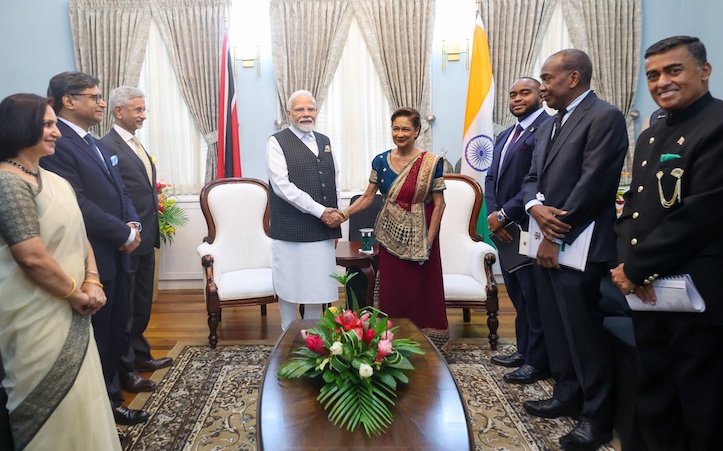Trinidad & Tobago has reaffirmed its full support for India’s bid to become a permanent member of an expanded United Nations Security Council (UNSC), marking a significant moment in India’s ongoing campaign for global governance reform. This endorsement came during Prime Minister Narendra Modi’s recent visit to Port of Spain, where both countries also signed six key agreements to deepen cooperation in areas such as pharmaceuticals, infrastructure, sports, and diplomatic training.
The joint statement released after talks between Prime Minister Modi and Trinidad & Tobago’s Prime Minister Kamla Persad-Bissessar highlighted the need for comprehensive reforms in the United Nations, especially the Security Council, to better reflect the current global realities. Both leaders agreed that the UNSC must expand its permanent and non-permanent membership to ensure it is more legitimate, representative, and effective in addressing today’s challenges.
India’s Case for Permanent Membership at UNSC
India’s case for a permanent seat in the UNSC is strong and widely recognised. With over 1.4 billion people, India represents one-sixth of humanity and is the world’s largest democracy. The country is now the world’s fifth-largest economy and a leading voice for the Global South, actively advocating for the concerns of developing nations at international forums. India’s economic strength, demographic advantage, and commitment to multilateralism make it a natural claimant for a permanent seat.
India’s contribution to the United Nations is longstanding and substantial. It has participated in more than 70 UN peacekeeping missions, sending over 195,000 troops and police, making it one of the largest contributors to peacekeeping operations globally. Indian peacekeepers have served with distinction in conflict zones across Africa, Asia, and the Middle East, and 168 have laid down their lives in the cause of global peace. This record underlines India’s commitment to the UN’s core mission of maintaining international peace and security.
The Need for Reform and Growing International Support
The current structure of the UNSC, established in 1945, does not reflect the realities of the 21st century. The world has changed dramatically since then, with new powers emerging and global challenges becoming more complex and interconnected. Yet, the Council’s five permanent members – the United States, the United Kingdom, France, Russia, and China – continue to wield disproportionate influence, often sidelining the interests and voices of developing countries. Expanding the Council to include India would make it more representative and democratic, ensuring that the perspectives of the Global South are heard at the highest level of international decision-making.
India’s bid enjoys broad international support. Four of the five current permanent members – the United States, the United Kingdom, France, and Russia – have publicly endorsed India’s candidacy. The President of the United Nations General Assembly has also expressed confidence in India’s capacity to shoulder the responsibilities of permanent membership. However, the process of reforming the UNSC is complex, requiring a two-thirds majority in the UN General Assembly and the consent of all existing permanent members, with China’s opposition remaining a significant hurdle.
Despite these challenges, India continues to build support for its bid through active diplomacy and leadership in groups like the G-4 (India, Japan, Germany, Brazil) and the L.69 Group of developing countries. The recent backing from Trinidad & Tobago is particularly meaningful, given the deep historical and cultural ties between the two nations, with over 40 percent of Trinidad & Tobago’s population being of Indian origin. During the visit, India also announced the issuance of Overseas Citizenship of India (OCI) cards up to the sixth generation for the Indian diaspora in Trinidad & Tobago, further strengthening people-to-people links.


